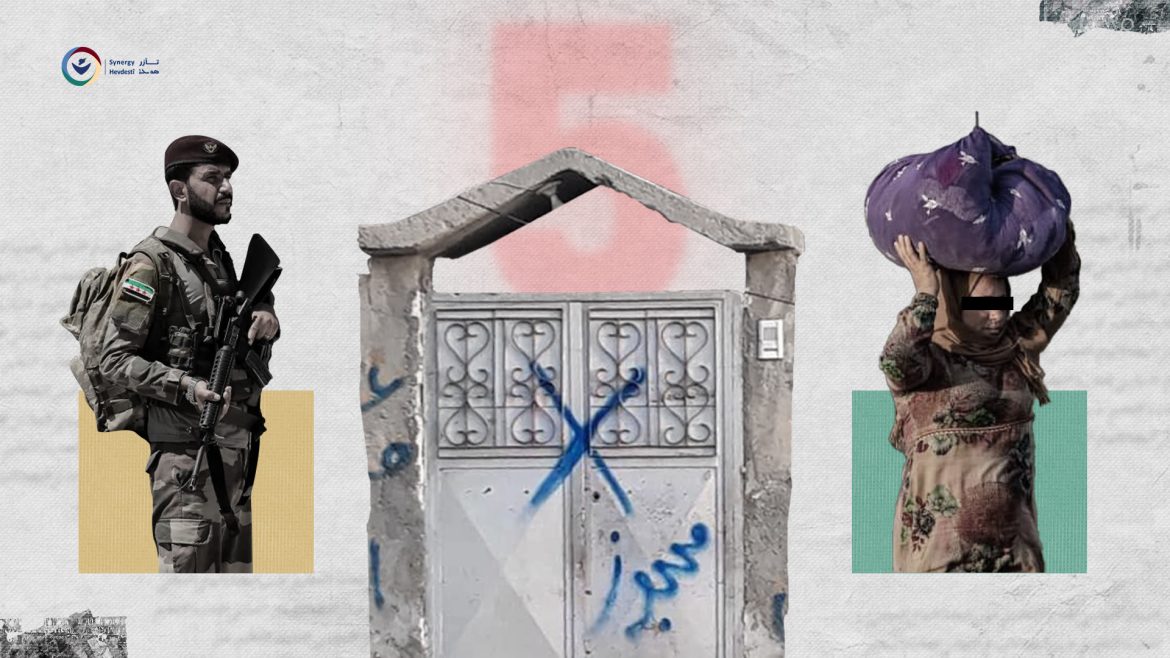Introduction:
Five years have passed since the Turkish occupation of areas of Ras al-Ayn/Serê Kaniyê and Tall Abyad as a result of the military operation dubbed “Peace Spring”, which began on October 9, 2019, under the pretext of establishing a ‘’ Safe Zone”. However, the reality has been the opposite. The region has lost its safety and stability, as well as continues to endure widespread violations under complete absence of accountability and lack of the rule of law.
Since October 2019, Synergy Association for Victims has documented the killing of 68 civilians, and the arrest of no less than 808, including seven people who died under torture. The region has witnessed 81 explosions that claimed the lives of 147 civilians and wounded 320 others. Furthermore, 71 internal fighting/clashes have occurred between factions of the Syrian National Army (SNA), during which six civilians were killed while 45 were injured.
Despite the passage of five years since the occupation of Ras al-Ayn/Serê Kaniyê and Tall Abyad, more than 150,000 indigenous people remain forcibly displaced, and living in dire humanitarian conditions in makeshift camps and shelters that that lack the basic necessities of life, without any support or official recognition from UN agencies. These people are unable to return home due to the ongoing violations committed by the SNA factions under the watch and with the involvement of Turkish forces.
Under the Turkish occupation, the region has undergone “massive demographic changes” that have significantly impacted its ethnic, religious, and language diversity. More than 85% of Ras al-Ayn/Serê Kaniyê inhabitants were forcibly displaced, and the Kurds became a minority as their number dwindled from 70,000 to just 42 individuals. On the other hand, in Tall Abyad, the Kurdish population, once comprising about 30% of the residents, has completely disappeared. The number of Armenian, Syriac, and Yezidi residents have also fallen to be very few, while the Arab population has been notably impacted as well.
The information and evidences verified by Synergy indicate that Turkey seeks to alter the demographic composition of the occupied territory through displacing tens of thousands of its indigenous people, and resettling in their houses thousands of displaced families from other Syrian regions, including dozens of relatives of Islamic State (ISIS) fighters. Let alone Turkish public attempts to settle one million refugees in the region.
The impact of ongoing violations committed by Turkish forces and the SNA faction extends beyond the local population, affecting all residents of al-Hasakah Governorate through the weaponization of water. The two parties have disrupted water from Allouk Water Station, located in east of Ras al-Ayn/Serê Kaniyê, at least 36 times since taking control of the region, although the station has been the sole source of drinking water for around 800,000 residents in al-Hasakah Governorate and its countryside. Additionally, it is the main source for supplying tanker trucks delivering water to the makeshift camps of al-Hawl, al-Areesha/al-Sadd, Washo Kani/al-Twaina, and Serê Kaniyê/al-Talae’, which house tens of thousands of IDPs from different Syrian governorates and regions. Furthermore, in 2021, the SNA factions built three earth dams on the Khabur River, cutting off water flow to northeast Syria, causing critical damages to agriculture and food security.
Despite that five years have passed, Turkey has not adhered to its responsibilities under the international law, and has not taken any tangible and serious measures to protect civilians or improve the situations. Instead, it has turned a blind eye to the widespread violations committed by the SNA factions. Consequently, crimes have been rife in these regions, as the absence of accountability encourages these violations to perpetuate, and exacerbate the suffering of the local people.
As an occupying power, Turkey is obligated under Article 43 of the 1907 Hague Regulations and the Fourth Geneva Convention of 1949, to take all the measures in its power to restore, and ensure, as far as possible, public order and safety. This obligation includes the duty to ensure respect for the applicable rules of International Human Rights Law (IHRL) and International Humanitarian Law (IHL), as well as to protect the population of the occupied territories from acts of violence and not to tolerate such violence by any third party.
Furthermore, Turkey has evaded its obligations under “the Ceasefire Agreement”, signed with the US on October 17, 2019, stipulating in several items to “pledge to uphold human rights, protect religious and ethnic communities, ensure the safety and well-being of all residents in the zone controlled by Turkey, and exercise maximum care in order not to cause harm to civilians and civilian infrastructure.”
Ending the occupation, ensuring the return of the displaced to their homes, and compensating those affected within a framework that guarantees accountability and justice for the victims are their most urgent priorities. A comprehensive sustainable peace cannot be achieved without reclaiming rights to their owners, holding accountable perpetrators of the crimes, and ensuring that such crimes are not repeated.
Background:
Since its entry into the areas of Ras al-Ayn/Serê Kaniyê and Tall Abyad, Turkey has exercised effective control over the region, as confirmed by the International Commission of Inquiry on the Syrian Arab Republic (COI) in its September 2020[1] report. This control is evidenced by the presence of Turkish military forces in more than 41 points and military bases, in addition to Turkey’s financial, military, and logistical support to the SNA factions. Turkish forces and several of these factions have also seized the homes of displaced civilians, turning them into military headquarters.
Turkey treats these regions as integral parts of its territory. Administratively, the two cities of Ras al-Ayn/Serê Kaniyê and Tall Abyad follow Turkey’s governorate of Şanlıurfa. Additionally, the “Syria Support and Coordination Center”, overseen by Şanlıurfa’s Governor, delivers public services, including water supply, garbage collection, city cleaning, healthcare services, and humanitarian assistance.[2]
Contrary to the Turkish narrative that its military operation will establish a “Safe Zone”, Turkey has failed to assume its responsibilities towards the territories it occupies in northern Syria, as it has not taken any serious measures to ensure public safety and security. Rather, the Turkish and the opposition SNA’ forces continue to commit violations against civilians and discriminate between them on ethnic grounds, under the lack of accountability and continuous impunity.
All of the above, combined with the lack of accountability and persistence of impunity, makes the Turkish-occupied territories unsafe and incompatible with the criteria of voluntary return set by the United Nations.
Areas of Ras Al-Ayn/Serê Kaniyê and Tall Abyad Fraught with Human Rights Violations:
Areas of Ras al-Ayn/Serê Kaniyê and Tall Abyad, which have been under the Turkish occupation since October 2019, have been marred by numerous human rights violations perpetuated by Turkish forces and Turkish-backed factions of the SNA. The documented violations included murder, arbitrary detention and enforced disappearance, torture, ill-treatment, looting, and property seizure, in addition to forcing the Kurd inhabitants to leave their houses, hindering the return of the native people and practices of Turkification and demographic changes, as the absence of accountability encouraged these violations to perpetuate, and exacerbated the suffering of the local people.
Synergy Association relied in its documentation process on the information collected in its database, provided by a network of field researchers and on information they obtained from victims, survivors, their families, and eyewitnesses. Furthermore, it verified the information from publicly available sources (open sources).
Synergy interviewed hundreds of civilian victims and survivors, as well as documented their accounts and testimonies since we are aware of the bulk of our responsibility towards the victims. Our strategy adopts an approach that focuses on the victims, survivors, and their families’ experiences, perspectives and priorities as an essential part of our daily work, in addition to seeking multiple perspectives to develop thorough and analytical understanding of the events and adhere to the highest degrees of accuracy and integrity.
The Association highlights that the violations committed by Turkey and the SNA-affiliated factions in areas of Ras al-Ayn/Serê Kaniyê and Tall Abyad are far more than what have been documented and verified, as we assert that the actual number of violations is significantly higher than the figure presented in this paper.
Murder and Arbitrary Detention:
Since the occupation of Ras al-Ayn/Serê Kaniyê and Tall Abyad in October 2019, Synergy has documented the killing of 68 civilians, including seven women, and the arrest of 808, including 86 women and 56 children, at the hands of Turkish forces and the Turkish-backed SNA factions.
According to Synergy’s documentations, 294 of the arrestees were enforced disappeared, leaving their families unable to clarify their fate. Moreover, 696 persons were subjected to torture in detention facilities run by the SNA’s factions, including seven who died under torture.
Synergy Association has confirmed Turkey’s complicity in the crime of concealing citizens from northeast Syria. It has been documented that no less than 121 Syrian arrestees were transferred to Turkey, of whom 62 persons were tried with arbitrarily sentences, ranging from 13 years to life imprisonment.
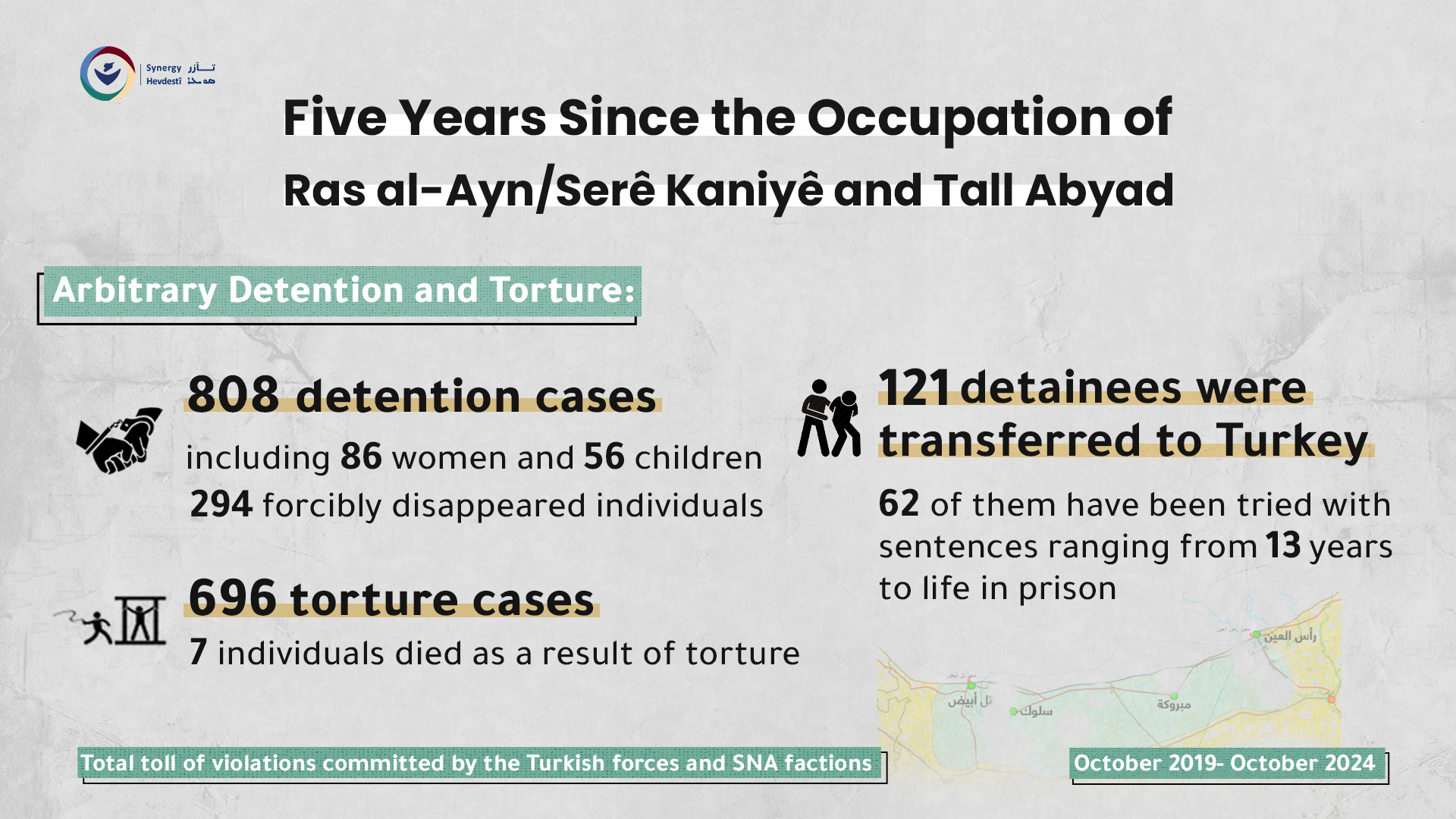
Forced Displacement and Property Appropriation:
More than 150,000 indigenous people from Ras al-Ayn/Serê Kaniyê and Tall Abyad remain to be forcibly displaced, due to the Turkish occupation. Turkey and the SNA factions have resettled more than 3,400 displaced families from other Syrian regions in the homes of these forcibly displaced people.
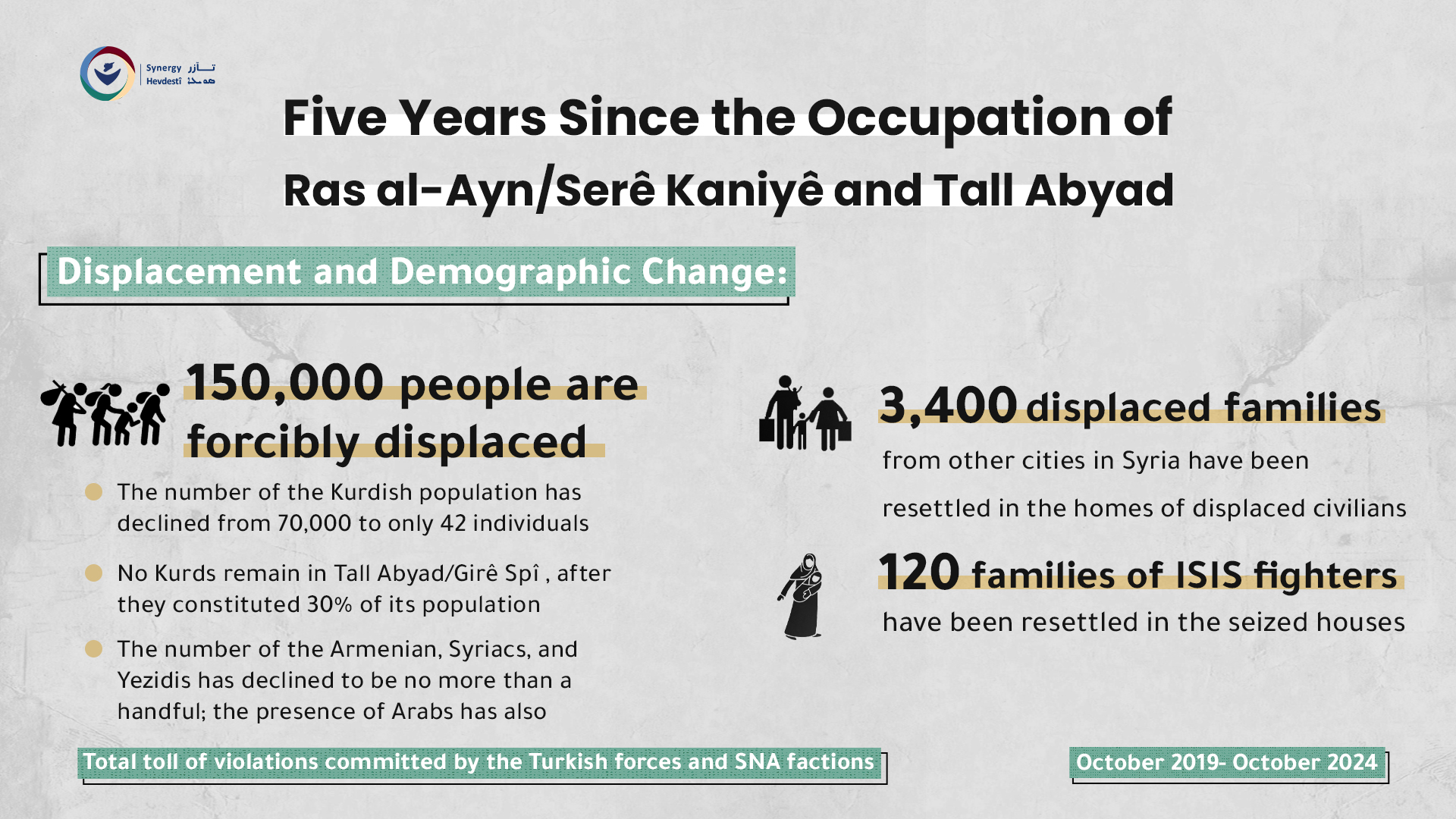
Synergy verified the resettlement of at least 120 families, including women and children of ISIS’s fighters, primarily Iraqis, in the seized homes in Ras al-Ayn/Serê Kaniyê and Tall Abyad. Furthermore, the Association documented those Turkish forces, and the SNA had seized over 6,200 homes, 1,200 stores and industrial facilities, and around one million dunums (100,000 acres) of farmlands. Additionally, 52 villages were depopulated from their original inhabitants.
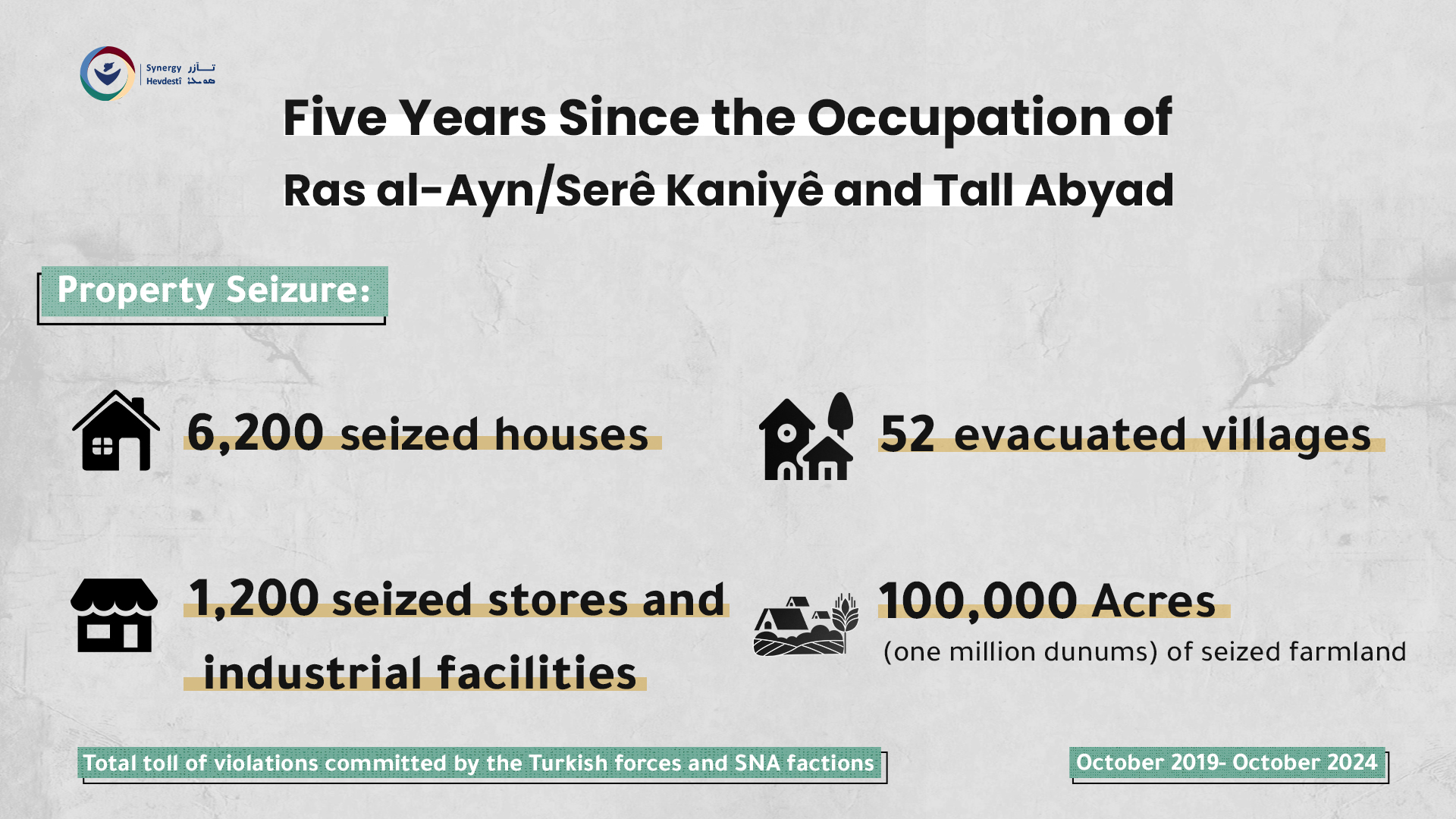
More than 85% of Ras al-Ayn/Serê Kaniyê inhabitants remain forcibly displaced, and the Kurds have become a minority, as their numbers dwindled from 70,000 to just 42 individuals, while in Tall Abyad, the Kurdish community declined to be just few families after they used to constitute around 30% of the population. The number of Armenian, Syriac, and Yezidi residents have also fallen to be very few, with the Arab component also getting affected remarkably.
Approximately 40,000 forcibly displaced people are living in dire humanitarian conditions in makeshift camps and shelters that lack the minimum necessities of life, without any support or official recognition from UN agencies. Two of these camps are located in the countryside of al-Hasakah City: Washo Kani/al-Twaina Camp, which shelters 16,730 individuals (2,361 families) and Serê Kaniyê/al-Talae’ Camp, which shelters 15,583 individuals (2,576 families). In addition to Tel Samen Camp in Raqqa that shelters 6,866 individuals (1,282 families).
Armed Chaos and Insecurity:
Contrary to the Turkish narrative that it will create a “Safe Zone”, Turkey has failed to assume its responsibilities towards the territories it occupies in northeast Syria, and has not taken any serious measures to ensure public safety and security. In addition, Turkey has turned a blind eye to the internal fighting between the SNA factions, and the proliferation and use of weapons between civilians under the lack of accountability and persistence of impunity.
From October 9, 2019 to October 9, 2024, at least 81 blasts occurred in areas of Ras al-Ayn/Serê Kaniyê and Tall Abyad, claiming the lives of 147 civilians, among them women and children, while injuring 320 others. Furthermore, 71 infightings between factions of the SNA were recorded, in which six civilians were killed and more than 45 were injured.
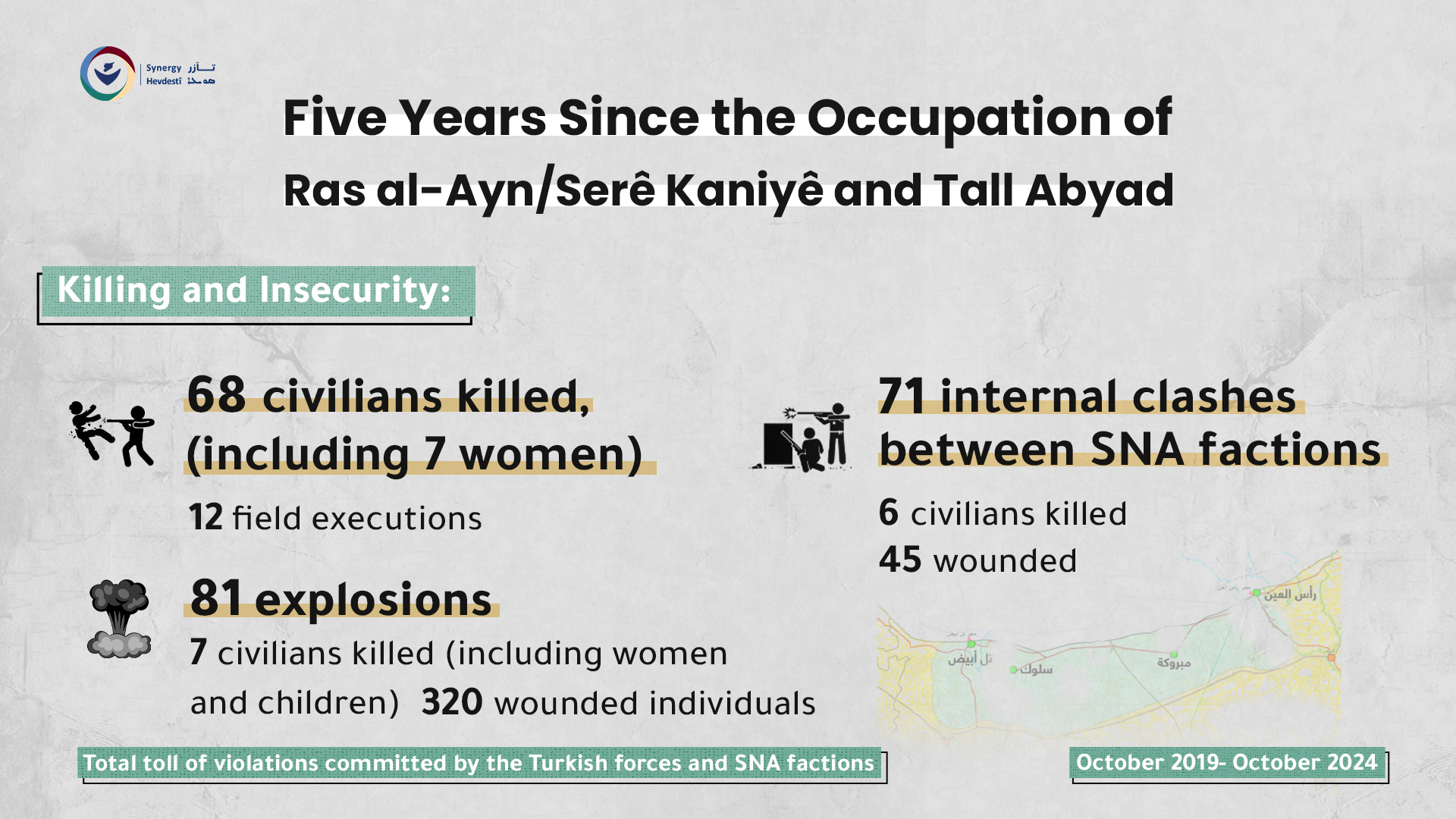
Recommendations:
- The United Nations Institutions and Mechanisms, Countries in the European Union, and the US:
- Acknowledging the Turkish presence on the Syrian territory as an explicit state of occupation, and prompting Turkey to fulfil its duties as an occupying state in accordance with the Fourth Geneva Convention provisions regarding the protection of civilians during armed conflict,
- Halting forced displacements aimed at rooting demographic change in the region, and providing a safe environment to ensure the voluntary and dignified return of forcibly displaced individuals to their original places of residence.
- The US:
Urging Turkey to adhere to its obligations as an occupying state, and to the commitments under the agreement concluded between the two parties, which stipulate refraining from harming civilians, upholding the safety and well-being of the residents in the region, as well as protecting religious and ethnic communities within it.
- The International Community, Particularly the UN:
Officially recognizing the camps sheltering IDPs coming from Turkish-occupied territories, providing adequate support that corresponds to the scale of the tragedy they are experiencing due to forced displacement, and cooperating with local relief organizations to identify needs and priorities and design appropriate interventions.
- The Turkish Government:
A) Assuming its legal responsibilities, taking immediate steps to cease potential human rights violations and war crimes committed by its military forces, Intelligence members, and its affiliated factions of the SNA, and ensuring that all those under its control abide by the International Human Rights Law (IHRL) and the International Humanitarian Law (IHL),
B) Conducting transparent, thorough, and impartial investigations into the documented violations, particularly those that Turkish military forces or Intelligence officials have been involved in, including arbitrary detention and torture, as well as property seizure, and to holding accountable the perpetrators through transparent and fair trials,
C) Assuring that victims in the occupied territories have access to effective legal remedies, including establishing mechanisms to report violations without fear of retaliation, providing reparations, and ensuring that judicial process are in line with international standard,
D) Ceasing or refraining from acts that disrupt the provision of essential services indispensable for the survival of the civilians inside and outside the occupied territories, such as water supply. - The Turkish Government and the European Union:
- Turkish authorities must halt all forced deportations of Syrian refugees and asylum seekers from Turkey to Syria,
- The European Union must affirm that Syria is unsafe and unsuitable for the return of the refugees, pressuring Turkey to stop illegal deportations and allowing the United Nations High Commissioner for Refugees (UNHCR) to play a monitoring role by directly engaging with refugees to ascertain their willingness to remain in Turkey or voluntarily return to Syria.
- Countries Operating under the Principle of Universal Jurisdiction in line with their National Laws:
Opening investigations in the crimes committed in the Turkish-occupied territories, under the international law, and holding accountable those involved, both individuals and groups, whether from the Turkish side or the SNA.
[1] The report released by the International Commission of Inquiry on the Syrian Arab Republic (COI) in September 2020, para 47. (A/HRC/45/31)
[2] Turkey’s AFAD, Şanlıurfa governorate distribute aid in northern Syria, DAILY SABAH, 27 Nov 2020.

